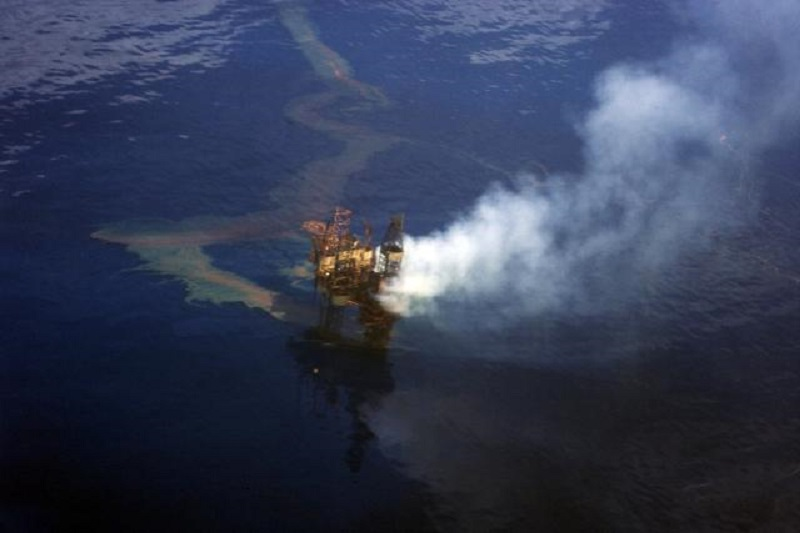
August 2009
The Montara oil spill happened on 21 August 2009 on the PTTEP-owned Montara wellhead platform in the Timor Sea, offshore Western Australia (WA). The leak was at water depths of approximately 76m, from a hole 3km below the seabed. Thankfully, the 69 workers on the platform were evacuated with no injuries or fatalities.
By 24 August the oil slick created by the spill was estimated to be 14km long and 30m wide, with this estimate increasing to 180km from east to west by 29 August.
September 2009
By September 2009, a report from the Australian Maritime Safety Authority (AMSA) indicated that the slick had spread over 6,000km2 and was 170km from the coast of WA. The report also revealed evidence that the slick had started killing marine life in the area.
Daily overflights by the Australian authorities in September and October 2009 discovered isolated patches of weathered oil and sheen “of concern to birdlife” within Indonesia’s exclusive economic zone, with the spill 248km from the Indonesian coastline.
November 2009
The West Triton rig drilled a relief well to intercept the leak on 1 November 2009. However a fire broke out on the platform during operations to kill the leak by pumping mud through the relief well, which further delayed efforts to resolve the spill.
It was finally stopped at 17:15 on 3 November 2009, after 3,400 barrels of mud had been pumped through the relief well to kill the leak and extinguish the fire.
October 2010
In October 2010, around 7,000 Indonesian fisherman reported that their livelihoods had been impacted by the leak, including cases of bankruptcy, with the number of red snapper in Indonesian waters being drastically reduced as a consequence of the spill.
West Timor Care Foundation representative Ferdi Tanoni told The Age: “Before this incident, they were able to catch about 100 red snapper a night. But now it’s extremely difficult to even get 20 fish.
“After the leak started the fishermen’s income dropped 40% but since last week it’s been 80% lower.”
June 2010
On 17 June 2010, the Australian government published the Montara Commission of Inquiry, which determined that the main cause of the leak was negligence on the part of PTTEP regarding the maintenance of the well.
August 2011
In August 2011 PTTEP Australasia pleaded guilty to four charges under the Offshore Petroleum and Greenhouse Gas Storage Act. The company was fined a total of $510,000, which concluded all government legal matters in relation to the Montara incident.
July 2018
In July 2018, PTTEP sold its 100% stake in the Montara oil field to Singaporean oil and gas company Jadestone Energy in a deal valued at $195m.
Jadestone Energy expects the formal transfer of operatorship of the Montara project to be completed by Q3 2019, pending final regulatory assessments.
January 2019
In January 2019, Jadestone Energy restarted production at the Montara oil field following suspension of operations by the National Offshore Petroleum Safety and Environmental Management Authority (NOPSEMA) in 2009.
“During the shutdown, Montara personnel logged more than 9,000 hours of work, all executed without a single safety incident,” Jadestone Energy president and CEO Paul Blakeley said.
“In addition to resolving the regulatory non-compliance notices, which, in our view, now safeguards the integrity and reliability of the Montara assets, we have worked closely with NOPSEMA to satisfy their concerns as laid out in Direction Notice 0732, and are waiting for their final support to a full restart of production.”
June 2019
In June 2019 a class action trial against PTTEP began, with over 15,000 seaweed farmers whose livelihoods were affected by the spill seeking more than AUD200m ($137m) in compensation.
The class action lawsuit was first filed in the Federal Court of Australia on 3 August 2016, with hearings held on 20 October 2016 and 1 August 2017. Judgement was given in favour of lead plaintiff Daniel Sanda on 15 November 2017, allowing his case against PTTEP to continue.
The trial is ongoing, and will be run by Australian class action law firm Maurice Blackburn over a period of ten weeks.
In a statement, Blackburn said: “Seaweed – known as “green gold” to the Indonesians – transformed the regions in the early 2000s as the alternative livelihood brought in new opportunities for local communities to boost their subsistence lifestyle.
“Following the oil spill, the industry rapidly declined and farmers who relied on it to make a living found themselves struggling to make ends meet.”



